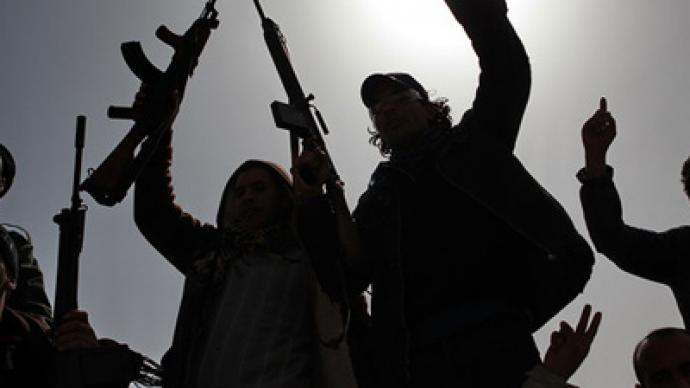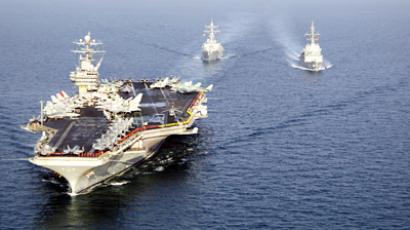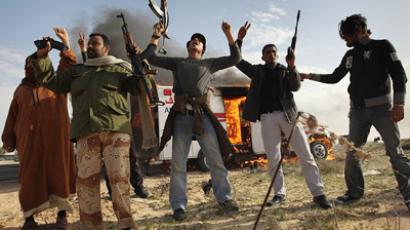To no-fly or not to no-fly Libya

While the UK and France are drafting a resolution for the UN Security Council to impose a no-fly zone over Libya, the US is reportedly attempting to intervene in the North African country indirectly by funneling weapons via Saudi Arabia.
Declaring a no-fly zone over Libya is one of the options which is currently being discussed by British and French policymakers, even though the option would mean a protracted and costly military campaign there.Imposing a no-fly zone over the country would give allied planes the right to shoot down anything that took off inside Libya. The idea would be to prevent Colonel Muammar Gaddafi from turning his air force on his own people. William Hague, the UK foreign secretary, is working closely with his French partners on what he calls “a contingency basis” on elements of the resolution for a no-fly zone, Reuters reported. In the event the no-fly zone resolution is presented to the Security Council, it may not go down particularly well. Russia has a veto on the UN Security Council and Russia's Foreign Minister Sergey Lavrov reiterated on Monday that Moscow is against any foreign intervention in the situation in Libya. “We have already made it clear that we do not see foreign intervention – and especially foreign military intervention – as a means of solving the crisis in Libya,” said Lavrov. “The Libyans have to solve their problems themselves, though not with the help of guns, but only by peaceful political means.”Libyan rebel forces say they would welcome the no-fly zone as they are outgunned by Gaddafi’s planes. But should Gaddafi’s armed ground forces receive no further support from air, the protesters say that they could deal with them.
Simon Tisdall, a foreign affairs columnist with the Guardian newspaper in London, points out that in order to impose a no-fly zone over Libya, the government’s ground defenses and most of its aircrafts and military bases would have to be destroyed first. Such an act, he said, could amount to a declaration of war.“How it will actually work in practice is extremely contentious,” said Tisdall. “Some of the American commanders have been saying that it is a very large country with very difficult terrain. And it would take an awful lot of hardware, even by American standards, to clamp down in a way that the allies clamped down in Iraq during the 1990s when Saddam Hussein was in control. There are suggestions that it might be quite hazardous, in the sense that the Libyans have a lot of aircraft missiles which they bought from Russia a few years ago. It is also unclear how you distinguish between Libyan military aircraft attempting to attack rebel targets, and commercial aircraft and humanitarian operations by European countries. It’s not a straightforward proposition.”
Karl Sharro, a writer and commentator on the Middle East, believes that the imposition of a no-fly zone is not justified, nor is any form of Western intervention. “The mechanics of a no-fly zone would take a bigger commitment than any Western state would be ready to make at this moment,” he said. “I think Western governments are pressuring themselves to be seen doing something on Libya, when actually I don’t think it’s the right approach. They should back off and not intervene, and allow the situation to be determined by the Libyan people themselves.” By contrast, Aziz Abu Sarah, director of Middle East Projects at George Mason University, argues that a no-fly zone is absolutely justified right now. “I think it is not military intervention,” he stated. “In Libya, there is no way that foreign troops will be able to get in [to the country]. If that happens, it will change the situation drastically. But the no-fly zone will only prevent Gaddafi from bombing his own civilians.”“What people would like to see is the Arab countries getting involved, and that is what the US has been trying to do,” he added. “Unfortunately, the Arab countries will not intervene because they see themselves in many ways in the same line with Gaddafi. They are afraid of facing the same situation, of being the next victim.”
Mad Dog and Englishmen
Meanwhile, on Monday the Western media has been speculating whether the US has or has not asked Saudi Arabia to airlift weapons to the rebels in their struggle against Gaddafi. The Saudis have been told that the rebels in Benghazi need anti-tank rockets and mortars as a first priority to hold off attacks by Gaddafi's armored forces, and ground-to-air missiles to shoot down his fighter bombers, according to the Independent newspaper.The Saudis’ assistance, if confirmed, would allow Washington to disclaim any military involvement in the supply chain, even though the arms would be American and they would be paid for by the Saudis.Supplies could reach Benghazi within 48 hours, the Independent reported.However by Monday evening Washington has officially denied the allegations, Russia's ITAR-TASS news agency reported.The situation in Libya is critical as it is, with hundreds of people dead and Gaddafi saying he will fight until the last man standing.NATO has launched 24-hour air surveillance of Libya with AWACS reconnaissance aircraft, US Ambassador to NATO Ivo Daalder said on Monday, Reuters reported."The decision was made to indeed increase the surveillance of the NATO AWACS capability, make it 24/7. We'll have a better picture of what is really going on in this part of the world," Daalder was quoted as saying by Reuters.With US allies being overthrown across the Middle East and Africa, the US is desperate to maintain its influence in the region.Secretary of State Hillary Clinton said that one of the biggest concerns of the US is Libya becoming a giant Somalia, according to the AFP news agency. That means a power vacuum, radical forces all around, and no more or less credible parliament to deal with. Analysts say a power vacuum in Libya would be very inconvenient for the US, considering Libya is rich with oil. It has the richest proven oil reserves in Africa. It is very hard to predict who will get hold of the riches if Gaddafi is ousted.The US once branded Gaddafi a mad dog, but later joined the European powers in reconciliation to exploit Libya’s oil wealth. Now that dealing with Gaddafi is no longer an option, experts say the US will try to influence the situation in another way – for example, by arming the rebels.But history shows that the practice of arming the other side of the conflict not only does not stop the violence, it inflames it even more.
American author and historian William Blum believes that asking Saudi Arabia to help the protesters is a rather questionable choice of aid.“Saudi Arabia is the most oppressive regime in the entire Middle East, and this is who US calls upon to help those people who are supposedly fighting for democracy and freedom? It is a very odd choice of an ally,” he said.Blum also says that foreign intervention could take the form of a no-fly zone, which can lead to not-so-good consequences for Libya, the US and the UK alike.“I must recall what happened in Iraq with the no-fly zone that was in operation there by the US and UK,” he said. “In a period of 12 years, the US and the UK did more than keep the planes of Iraq on the ground. They bombed the people of Iraq repeatedly; they must have killed hundreds of people.”
Alain Gresh, author and editor of "Monde Diplomatique" newspaper, says the intervention will not be an option for either the worldwide community, nor the rebels in Libya – all of them for pretty the same reasons. “We have experimented, if we can say, with military intervention in Afghanistan and in Iraq. They all were catastrophic. It does not solve the problem. On the contrary, it can even reinforce the regime in Tripoli. It is very dangerous and can have consequences on the neighboring countries. Military intervention could happen, at some time, but it really must be a last resort operation. Military intervention will not have the support of the United Nations, so it will be a NATO intervention. It will be perceived by the Arab people as a Western intervention and it will strengthen the jihadists in the Arab world and the people who are against the Western world, in general,” says Gresh.“The rebels were very clear they do not want foreign troops on their soil. The Arab world has experimented with Western troops on their soil – in Iraq – and they have fought against it. These people are real nationalists, they are not in the hands of either the United States, nor of Europe,” concludes Gresh.
Michel Chossudovsky, Director of the Center for Research on Globalization in Canada, calls Western operations in Libya a “project of conquest, and not a humanitarian undertaking.” With oil at stake, the US has everything to lose in the region. “We are at a very dangerous crossroads”, says Chossudovsky. “With US and NATO military advisors and special forces theoretically helping the rebels, what does it imply in the terms of international law? This is an interference in the affairs of a sovereign country.”“This is not a protest movement, as in Egypt and Tunusia”, Chossudovsky point out. “This is an armed insurrection. And the public opinion has been lead to believe somehow that conditions in Egypt and Tunisia have, so to speak, spread to Libya and that this is a spontaneous insurrection. Actually it is not, it has been planned well in advance. Most probably those special forces were already on the ground prior to those of insurrection.” With the imposing of a no-fly zone over Libya, “what is on drawing board is an all-out blitzkrieg directed against a sovereign country”, concludes Chossudovsky.














